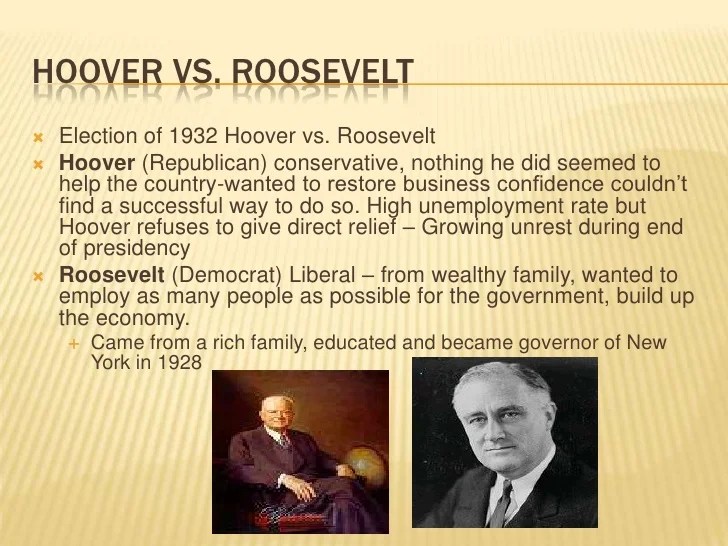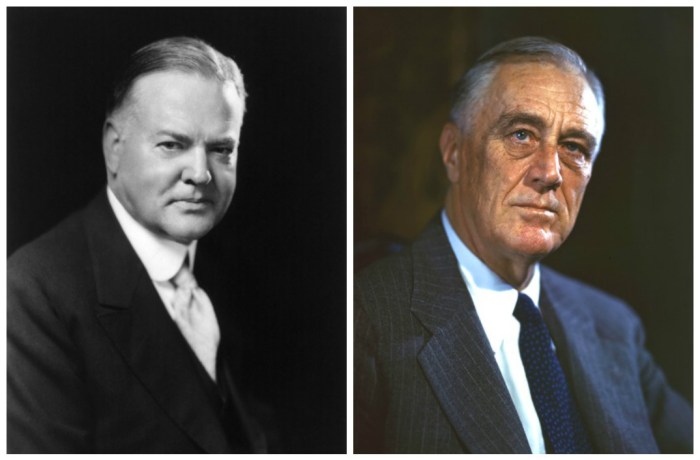Hoover vs fdr venn diagram – In the annals of American history, the presidencies of Herbert Hoover and Franklin D. Roosevelt stand as stark contrasts in their approaches to governance. This Hoover vs. FDR Venn diagram delves into the similarities and differences between these two leaders, examining their domestic and foreign policies, political philosophies, and leadership styles.
From Hoover’s laissez-faire approach to FDR’s New Deal interventions, their economic policies shaped the nation’s response to the Great Depression. Their foreign policies, isolationist under Hoover and internationalist under FDR, influenced America’s role in global affairs. Moreover, their divergent political ideologies, with Hoover’s belief in limited government and FDR’s commitment to social welfare, left lasting imprints on American governance.
Domestic Policies: Hoover Vs Fdr Venn Diagram
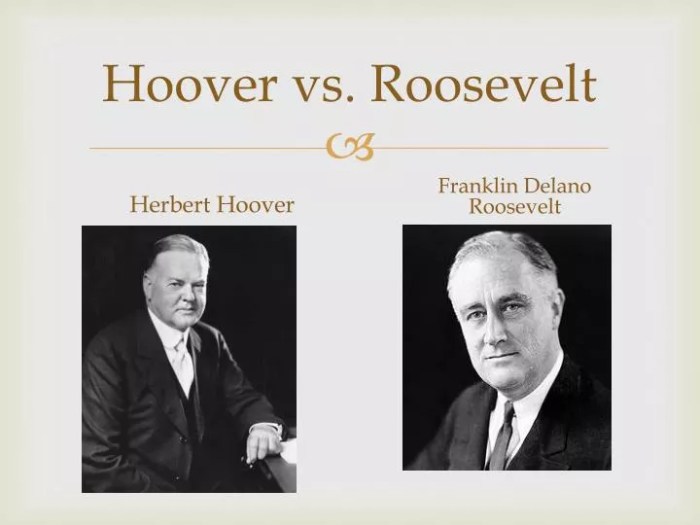
Herbert Hoover and Franklin D. Roosevelt’s contrasting approaches to the Great Depression had profound impacts on the American economy and society. Hoover’s laissez-faire approach, characterized by minimal government intervention, differed starkly from FDR’s New Deal, which emphasized active government involvement in economic recovery.
Hoover’s belief in the self-correcting nature of the market led him to oppose direct government intervention. He argued that the economy would eventually rebound without government interference. However, this approach proved ineffective as the Depression worsened.
The New Deal
FDR’s New Deal, on the other hand, sought to stimulate economic growth and provide relief to the unemployed. It involved a wide range of programs, including the creation of the Social Security system, the Tennessee Valley Authority, and the Works Progress Administration.
While the New Deal did not fully end the Depression, it had a significant impact on the American economy and society. It helped to stabilize the banking system, create jobs, and provide relief to those in need.
Impact on the American Economy and Society
The contrasting approaches of Hoover and FDR had a lasting impact on the American economy and society. Hoover’s laissez-faire approach is often criticized for prolonging the Depression, while FDR’s New Deal is credited with helping to end it.
The New Deal also had a profound impact on the role of government in American society. It expanded the role of government in providing social welfare and economic regulation, a legacy that continues to shape American politics today.
Foreign Policies
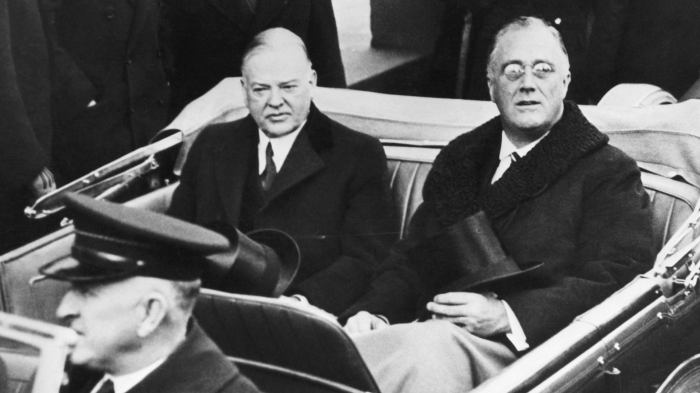
Hoover and FDR held contrasting views on foreign policy. Hoover embraced isolationism, seeking to minimize US involvement in international affairs. FDR, on the other hand, adopted an internationalist approach, recognizing the growing interconnectedness of the world.
Hoover’s Isolationism, Hoover vs fdr venn diagram
Hoover’s isolationism was rooted in the belief that the US should avoid entangling alliances and focus on domestic concerns. He withdrew the US from the League of Nations and pursued a policy of non-intervention in Latin America.
Drawing a Venn diagram comparing Hoover and FDR’s policies is an interesting exercise in political science. However, it’s also worth considering the similarities and differences between general education and special education. General ed vs special ed share some common goals, such as providing students with the skills they need to succeed in life.
However, they also have some distinct differences, such as the level of support that students receive. Understanding these differences can help parents and educators make informed decisions about the best educational setting for each student. Returning to the Hoover vs FDR Venn diagram, it’s clear that both presidents had a significant impact on the course of American history.
FDR’s Internationalism
FDR’s internationalism was driven by his belief that the US had a responsibility to engage with the world. He joined the League of Nations and promoted cooperation through organizations like the United Nations. He also played a key role in the development of the Good Neighbor Policy, which sought to improve relations with Latin America.
Responses to Fascism and World War II
Hoover’s isolationism made it difficult for the US to respond effectively to the rise of fascism in Europe and the outbreak of World War II. FDR, on the other hand, was more willing to intervene, providing support to the Allies and eventually declaring war on the Axis powers.
Consequences of Foreign Policies
Hoover’s isolationism had the unintended consequence of weakening the US’s ability to influence global events. FDR’s internationalism, on the other hand, helped to establish the US as a global superpower and laid the foundation for the post-war world order.
Political Philosophies
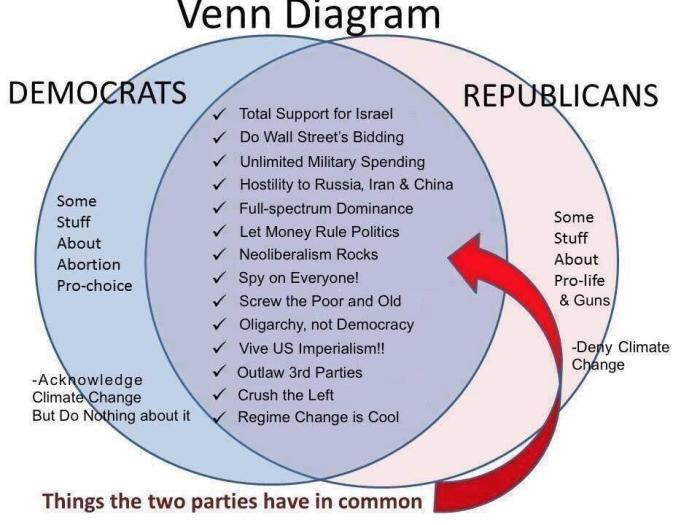
Herbert Hoover and Franklin D. Roosevelt held contrasting political philosophies that shaped their respective approaches to governance. Hoover believed in limited government intervention and individual responsibility, while FDR advocated for social welfare and government intervention.
Hoover’s Belief in Limited Government
Hoover believed that the government should play a minimal role in the economy and society. He argued that excessive government intervention stifled individual initiative and created dependency. Hoover’s philosophy emphasized self-reliance, free markets, and a balanced budget.
FDR’s Commitment to Social Welfare
In contrast, FDR believed that the government had a responsibility to ensure the well-being of its citizens. He argued that the government should provide social welfare programs, such as unemployment insurance, old-age pensions, and healthcare, to protect those in need.
FDR’s philosophy emphasized social justice, economic equality, and government intervention.
Implications for American Governance
The differences between Hoover’s and FDR’s political philosophies had significant implications for American governance. Hoover’s limited government approach led to a laissez-faire economic policy that exacerbated the Great Depression. FDR’s social welfare philosophy led to the New Deal, a series of programs designed to stimulate the economy and provide relief to those affected by the Depression.
Leadership Styles

Herbert Hoover and Franklin D. Roosevelt (FDR) exhibited contrasting leadership styles that significantly impacted their ability to mobilize the American people during times of crisis. Hoover’s aloof and detached demeanor differed starkly from FDR’s charismatic and empathetic approach, shaping the course of American history in distinct ways.
Hoover’s Leadership
Hoover’s leadership style was characterized by a sense of aloofness and detachment. He maintained a distant relationship with the public, relying on advisors and intermediaries to communicate his policies. This approach limited his ability to connect with the American people, especially during the Great Depression.
FDR’s Leadership
In contrast, FDR’s leadership was marked by charisma and empathy. He possessed a remarkable ability to connect with the American people on a personal level. Through his “fireside chats” on the radio, FDR conveyed a sense of optimism and reassurance during the darkest days of the Depression.
He fostered a sense of national unity and purpose, inspiring the American people to overcome adversity.
Impact on Mobilization
Hoover’s aloofness hindered his ability to mobilize the American people during the Great Depression. His detached approach created a sense of distrust and disconnection, making it difficult to rally support for his policies. FDR’s charismatic leadership, on the other hand, proved highly effective in mobilizing the American people.
His ability to connect with them on a personal level inspired confidence and a willingness to follow his lead.
Effectiveness in Shaping History
The contrasting leadership styles of Hoover and FDR had a profound impact on the course of American history. Hoover’s aloofness and detachment contributed to the deepening of the Great Depression, while FDR’s charisma and empathy played a vital role in leading the nation out of the crisis.
FDR’s leadership also laid the foundation for the New Deal, which transformed the role of government in American society and shaped the nation’s trajectory for decades to come.
Question & Answer Hub
What was the key difference between Hoover’s and FDR’s economic policies?
Hoover favored a laissez-faire approach, while FDR implemented the New Deal, a series of government interventions aimed at stimulating economic recovery.
How did Hoover’s foreign policy differ from FDR’s?
Hoover pursued an isolationist stance, while FDR adopted an internationalist approach, engaging more actively in global affairs.
What were the main tenets of Hoover’s and FDR’s political philosophies?
Hoover believed in limited government and individual responsibility, while FDR advocated for social welfare and government intervention.
